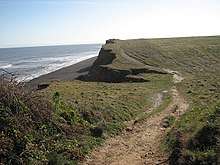Weybourne Cliffs
Weybourne Cliffs is a 40.9-hectare (101-acre) biological and geological Site of Special Scientific Interest west of Sheringham in Norfolk.[1][2] It is a Geological Conservation Review site.[3][4] It is in the Norfolk Coast Area of Outstanding Natural Beauty.[5]
| Site of Special Scientific Interest | |
 | |
| Area of Search | Norfolk |
|---|---|
| Grid reference | TG 133 435[1] |
| Interest | Biological Geological |
| Area | 40.9 hectares (101 acres)[1] |
| Notification | 1985[1] |
| Location map | Magic Map |
This Pleistocene site is the type locality for the Pastonian Weybourne Crag Formation, and its fossils of marine molluscs have been studied for 200 years. Its ecological interest lies in colonies of sand martins in the cliffs.[6]
The beach is open to the public.
References
- "Designated Sites View: Weybourne Cliffs". Sites of Special Scientific Interest. Natural England. Retrieved 22 June 2018.
- "Map of Weybourne Cliffs". Sites of Special Scientific Interest. Natural England. Retrieved 22 June 2018.
- "Weybourne Cliffs (Quaternary of East Anglia)". Geological Conservation Review. Joint Nature Conservation Committee. Retrieved 25 May 2018.
- "Weybourne Cliffs (Pleistocene Vertebrata)". Geological Conservation Review. Joint Nature Conservation Committee. Retrieved 25 May 2018.
- "Norfolk Coast AONB Management Plan 2014-19: Other Conservation Designations within the AONB" (PDF). Norfolk Coast AONB. Retrieved 25 May 2018.
- "Weybourne Cliffs citation" (PDF). Sites of Special Scientific Interest. Natural England. Retrieved 22 June 2018.
| Wikimedia Commons has media related to Weybourne Cliffs. |
This article is issued from Wikipedia. The text is licensed under Creative Commons - Attribution - Sharealike. Additional terms may apply for the media files.